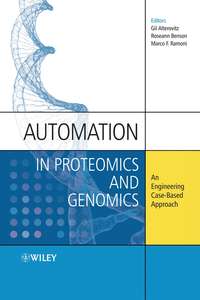Gil Alterovitz - Automation in Proteomics and Genomics. An Engineering Case-Based Approach

In the last decade DNA sequencing costs have decreased over a magnitude, largely because of increasing throughput by incremental advances in tools, technologies and process improvements. Further cost reductions in this and in related proteomics technologies are expected as a result of the development of new high-throughput techniques and the computational machinery needed to analyze data generated. Automation in Proteomics & Genomics: An Engineering Case-Based Approach describes the automation technology currently in the areas of analysis, design, and integration, as well as providing basic biology concepts behind proteomics and genomics. The book also discusses the current technological limitations that can be viewed as an emerging market rather than a research bottleneck. Topics covered include: molecular biology fundamentals: from ‘blueprint’ (DNA) to ‘task list’ (RNA) to ‘molecular machine’ (protein); proteomics methods and technologies; modelling protein networks and interactions analysis via automation: DNA sequencing; microarrays and other parallelization technologies; protein characterization and identification; protein interaction and gene regulatory networks design via automation: DNA synthesis; RNA by design; building protein libraries; synthetic networks integration: multiple modalities; computational and experimental methods; trends in automation for genomics and proteomics new enabling technologies and future applications Automation in Proteomics & Genomics: An Engineering Case-Based Approach is an essential guide to the current capabilities and challenges of high-throughput analysis of genes and proteins for bioinformaticians, engineers, chemists, and biologists interested in developing a cross-discipline problem-solving based approach to systems biology.









